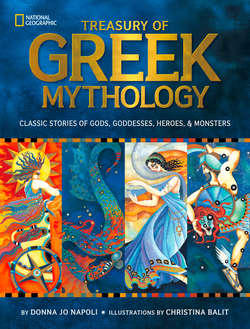Читать книгу Treasury of Greek Mythology: Classic Stories of Gods, Goddesses, Heroes & Monsters - Christina Balit - Страница 11
Оглавление
Hestia’s first memory was of blackness. And stifling heat. Then something tumbled in beside her, all wiggly. And another wiggly something. And two more. And, finally, a giant lump. She was crowded, poked and prodded, cramped. And so breathlessly, unrelentingly hot. She didn’t know she was trapped in her father Cronus’ belly. She didn’t know the wiggly somethings around her were her sisters Demeter and then Hera, and her brothers Hades and then Poseidon. She didn’t know the lump was a stone her father had been duped into swallowing in place of his sixth child. She knew only great discomfort and an undefined lack that gnawed at her spirit. Something was supposed to be happening. Someone was supposed to be there. Somehow everything was wrong, everything hurt. A vague fear lodged in her heart.
Then came a constriction so tight and forceful, Hestia screamed, there in the place with no air. Silent and pained, she screamed and screamed until her throat was raw, and she was pushed up and up and out. She lay, disgorged on the ground, with brothers and sisters and that one stone, blinking at the rude light of day, shrinking from the edginess of the noises carried through the air, wet and shivering and shocked to be separate from the four other wiggly bodies and the lump of a stone.
GENTLE Goddess
Hestia is a mysterious figure; she appears only as the goddess prayed to about family matters. The ancient Greeks seemed to hold family concerns private, separate from the usual squabbles of their stories. The earliest records of family law in Greece are the codes of Gortyn in Crete in 450 B.C., which concern finances; they don’t tell how an ordinary family should behave at home. Probably the father ruled, given how royal households in Greek mythology behaved. But that’s just a guess.
A temple dedicated to Hestia, illustrated on an ancient coin
Her brother Zeus had freed them, strange thing that he was, all tanned and muscular and accustomed to everything Hestia found so foreign. He freed them, only to tell them they must fight at his side against their father Cronus and his sister and brother Titans. Rocks, spears, axes. Shouts, cries, howls. Freed into a war? This was freedom? Was the world insane?
Hestia cringed. She picked up rocks in both hands and feigned interest whenever others watched her, but, fortunately, they rarely did. She climbed trees and peeked through their thick foliage, hoping for a glimpse of her mother Rhea, of the arms that had never cradled her, the hands that had never caressed her. She built a mound of stones with a pit in the middle and sat there hidden, wondering when the sweat and blood and tears would ever stop, and, if they did, who she would then be. For up to this point, she had been no one, really.
And then it ended. But not because the animosity had run its course. No. It ended because her brother Zeus got the help of strange men with fifty heads and a hundred arms, and because other strange men with a single eye in the middle of their foreheads gave Zeus the lightning bolt—the great cheat. That’s how the war ended—with one side getting a weapon the other had no equal of. Cheat cheat cheat.
Hestia’s brothers were impressed with Zeus’ power. Poseidon was only too happy to rule the seas, Hades was only too happy to rule the Underworld, and both were only too happy to leave the rest to Zeus.
Hestia’s sisters were impressed with Zeus’ tanned skin and muscled legs and arms and chest and back. Each looked at him with flirty eyes.
Only Hestia saw Zeus as a frightful maniac. She kept her distance from him and all other males, like a shy spider.
She looked everywhere, and she saw the families the Titans had formed over the years, and she saw the families their children were forming and the families their grandchildren were forming, and she saw a kind of love that made her ache. They sat around the hearth eating and talking and teasing with one another. They hugged and laughed. That love—that was what Hestia wanted to foster in the world. And so Hestia became the goddess of hearth and home, and in her quiet, still way she finally banished the fear from her heart and found a gentle, soothing peace.
Ancient Greek families took consolation from knowing Hestia watched over their daily home life in the gentlest of ways. And Hestia found peace in giving that consolation.
